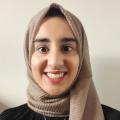
A GP who is leading the NHS’ mission to reduce inequality in healthcare has praised Bradford’s services for homeless residents and vulnerable women.
Dr Bola Owolabi, NHS Director – Health Inequalities, visited the Bevan Healthcare clinic which offers evening appointments and an outreach bus in one of Britain’s most deprived areas.
In 2019, as part of its long-term plan, NHS England increased funding — estimated to be worth more tan £1 billion by 2023/24 — to tackle health inequalities in areas with the highest rates of early death and poor physical and mental health. Central Bradford was one of these places.
Reducing Inequalities in Communities (RIC) is one of the enabler programmes for the Bradford District and Craven Health and Care Partnership.
Dr Owolabi, who also works as a GP in the Midlands, said: “The services I witnessed support some of the most vulnerable groups in our society and those at highest risk of healthcare inequalities.
“Bradford is a great example of what can be achieved when services are designed and delivered with patients at the heart, an approach we need to see more of across the country.”
The Bevan clinic is planning late night appointments each Thursday which are useful for homeless people, who can also be reached by an outreach bus seven days a week. It provides a 'street doctor' service.
Hakki Ozal is a former service user and political asylum seeker from Turkey who now works for the clinic. He said: “Finding the Bevan clinic, first as a patient and then a volunteer and now in a paid role, has turned my life around.”
Dr Owolabi also visited a doula project, a service part-funded by the NHS which offers support to pregnant women in Bradford from ethnic minorities who might not be aware of the antenatal care on offer.
Dr Sohail Abbas, deputy clinical chair and strategic clinical director of population health and wellbeing in Bradford District and Craven Clinical Commissioning Group, said: “We are thrilled that Dr Owolabi has been able to take the time to visit Bradford and see the important work we are doing on the ground as part of the RIC programme.
“There are significant inequalities across our communities and the gap in how long people live is stark. People in the most deprived areas of our district are living with more ill health and dying earlier.
"Covid-19 has shone a harsh spotlight on existing health inequalities, so it’s vital we continue our focus on the important work happening in the RIC programme.”



Comments: Our rules
We want our comments to be a lively and valuable part of our community - a place where readers can debate and engage with the most important local issues. The ability to comment on our stories is a privilege, not a right, however, and that privilege may be withdrawn if it is abused or misused.
Please report any comments that break our rules.
Read the rules hereLast Updated:
Report this comment Cancel